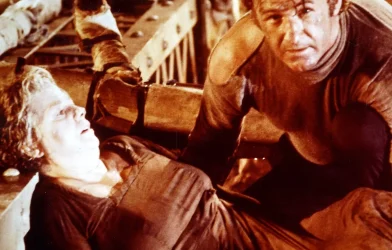Principle II: Make It Repetitive
This also is a principle in the list of what makes a good streaming movie. It’s hard to avoid distractions: dogs, doorbells, kitchen snacks, Instagram. Plane distractions are different: disruptive neighbors, captains’ rhapsodies regarding altitude, drink carts, general loudness. An obvious and repetitive screenplay is necessary, one that follows the time-honored principles honed by teachers and preachers: Tell them what you’re going to tell them, then tell them, then tell them what you told them.
This happens a great deal in “The Ministry of Ungentlemanly Warfare,” which was adapted by four screenwriters from the nonfiction book “The Ministry of Ungentlemanly Warfare: How Churchill’s Secret Warriors Set Europe Ablaze and Gave Birth to Modern Black Ops” by Damien Lewis. The band of rogues are led by Gus March-Phillipps (mustachioed Henry Cavill), who is good with a gun and refuses to take orders. He brings together the munitions expert Freddy Alvarez (Henry Golding), the ship’s captain Henry Hayes (Hero Fiennes Tiffin), the strategist Geoffrey Appleyard (Alex Pettyfer) and the comically ripped Dane Anders Lassen (Alan Ritchson); the actress Marjorie Stewart (Eiza González) and Fernando Po’s premiere club owner Mr. Heron (Babs Olusanmokun) are part of the crew too.
Early in the movie, British intelligence leaders — Churchill (Rory Kinnear), Brigadier Gubbins (Cary Elwes) and Ian Fleming (Freddie Fox), the future creator of James Bond — discuss the mission and their need to cut off supply lines to the U-boats. Then they call in March-Phillipps and explain the mission to him. Then he explains the mission to his team, and if I wasn’t counting wrong it’s explained at least once more.
By the last act of the movie (by which said plan, unsurprisingly, has had to shift a little), March-Phillipps is reduced to mostly standing around narrating whether or not the plan is going well. “That wasn’t supposed to happen yet,” he says, when something wasn’t supposed to happen yet.
Great gobs of expository dialogue are exasperating if you’re paying attention. But if you missed what that group of guys were talking about because the snack tray came by, don’t worry: they’ll say it again later.
Principle III: Lower the Stakes
Yes, it actually mattered immensely who won World War II, for reasons I hope we all understand. But “The Ministry of Ungentlemanly Warfare” goes very light on those conversations. Characters’ hatred of the Nazis is linked to the murders of family members, including one character with a Jewish family. But the longest and most detailed conversation about the stakes suggests that if the Germans won the war, everyone would have to eat sausages, cabbage and brown bread forever, and nobody would want that.









